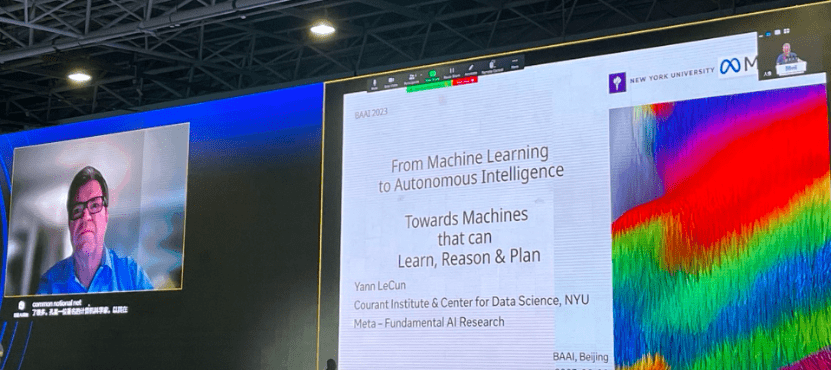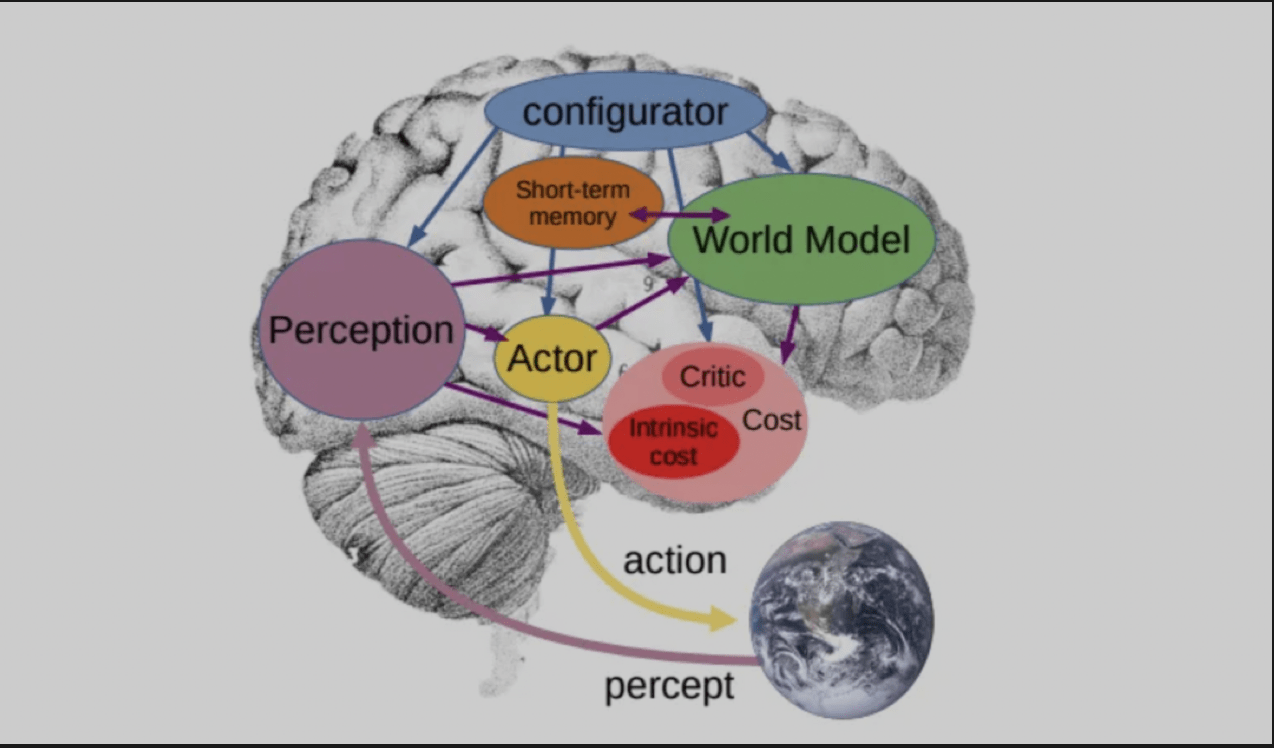 Technology peripherals
Technology peripherals
 AI
AI
 Turing Award winner Yang Likun: AI has limited logical reasoning and planning capabilities and will make factual and logical errors.
Turing Award winner Yang Likun: AI has limited logical reasoning and planning capabilities and will make factual and logical errors.
Turing Award winner Yang Likun: AI has limited logical reasoning and planning capabilities and will make factual and logical errors.

Produced by Sohu Technology
Author|Zheng Songyi
On June 9, the 2023 Zhiyuan Artificial Intelligence Conference was held in Beijing. At four o'clock in the morning local time in France, Yann LeCun, known as one of the "Three Giants of Deep Learning in the World", delivered a speech on the French video link in Beijing with the theme "Towards a Large Model Capable of Learning, Reasoning and Planning" The speech expressed in-depth thinking about artificial intelligence.
Sohu Technology watched this speech at the Zhiyuan Conference. From Yang Likun’s smiling expression during the speech, we can feel Yang Likun’s positive and optimistic attitude towards the development of artificial intelligence. Previously, when Musk and others signed a joint letter stating that the development of artificial intelligence would bring risks to human civilization, Yang Likun publicly refuted it, believing that artificial intelligence has not yet developed to the extent of posing a serious threat to mankind. In his speech, Yang Likun once again emphasized that artificial intelligence is controllable. He said, "Fear is caused by the anticipation of potential negative results, while elation is generated by the prediction of positive results. With a goal-driven system like this, I Call it 'goal-driven AI', it will be controllable because we can set goals for it through a cost function, ensuring that these systems don't want to take over the world, but instead, it succumbs to humanity and security .”
Yang Likun said that the gap between artificial intelligence and humans and animals lies in logical reasoning and planning, which are important features of intelligence. Today's large models can only "react instinctively."
"If you train them with one trillion or two trillion tokens, the performance of the machine is amazing, but eventually the machine will make factual errors and logical errors, and their reasoning capabilities are limited."
Yang Likun emphasized that language models based on self-supervision cannot obtain knowledge about the real world. He believes that machines are not very good at learning compared to humans and animals. For decades, the way to develop systems has been to use supervised learning, but supervised learning requires too many labels, learning anything requires a lot of trials, and the results of reinforcement learning are unsatisfactory. These systems are fragile and make mistakes. Dull and wrong, and not really able to reason or plan.
"Just like when we give a speech, how to express one point to another and how to explain things is planned in our brains, rather than improvising word by word. Maybe at a low level, we are improvising play, but at a high level, we must be planning. So the need for planning is very obvious. My prediction is that in a relatively short few years, sane people will definitely not use autoregressive elements (self-supervised One of the models in learning methods). These systems will soon be abandoned because they are beyond repair."
He said that in order for the language model to truly understand the knowledge of the real world, a new architecture is needed to replace it, and this architecture is the architecture he proposed in the paper he published a year ago, "Autonomous Intelligence (Autonomous Intelligence)" ". This is an architecture in which a configuration module controls the entire system and performs prediction, reasoning, and decision-making based on input information. The "world module" has the ability to estimate missing information and predict future external conditions.

Talking about the challenges that AI will face in the next few years, Yang Likun pointed out three aspects. The first is to learn the representation and prediction model of the world; the second is to learn to reason, that is, to learn how to use thinking consciously and purposefully to complete tasks. ;The final challenge is how to plan complex sequences of actions by breaking down complex tasks into simpler tasks, running them in a hierarchical manner.
Speaking of this, Yang Likun introduced another model he published in the paper, "World Model", which can imagine a scene and predict the results of actions based on the scene. The goal is to find a sequence of actions that is predicted by its own model of the world and that minimizes a range of costs.
When Yang Likun was asked during the Q&A session about an upcoming debate on the status and future of AGI, he said that the debate would revolve around the question of whether artificial intelligence systems pose existential risks to humans. Max Tegmark and Yoshua Bengio will side with the “yes,” arguing that powerful AI systems could pose existential risks to humans. And Liqun Yang and Melanie Mitchell will be on the “no” side.
"Our point is not that there are no risks, but that although these risks exist, they can easily be mitigated or suppressed through careful design."
Yang Likun believes that the super-intelligent system has not yet been developed. After it is invented, it will be too late to discuss "whether the super-intelligent system can be made safe for humans."
The above is the detailed content of Turing Award winner Yang Likun: AI has limited logical reasoning and planning capabilities and will make factual and logical errors.. For more information, please follow other related articles on the PHP Chinese website!

Hot AI Tools

Undresser.AI Undress
AI-powered app for creating realistic nude photos

AI Clothes Remover
Online AI tool for removing clothes from photos.

Undress AI Tool
Undress images for free

Clothoff.io
AI clothes remover

AI Hentai Generator
Generate AI Hentai for free.

Hot Article

Hot Tools

Notepad++7.3.1
Easy-to-use and free code editor

SublimeText3 Chinese version
Chinese version, very easy to use

Zend Studio 13.0.1
Powerful PHP integrated development environment

Dreamweaver CS6
Visual web development tools

SublimeText3 Mac version
God-level code editing software (SublimeText3)

Hot Topics
 1386
1386
 52
52
 I Tried Vibe Coding with Cursor AI and It's Amazing!
Mar 20, 2025 pm 03:34 PM
I Tried Vibe Coding with Cursor AI and It's Amazing!
Mar 20, 2025 pm 03:34 PM
Vibe coding is reshaping the world of software development by letting us create applications using natural language instead of endless lines of code. Inspired by visionaries like Andrej Karpathy, this innovative approach lets dev
 Top 5 GenAI Launches of February 2025: GPT-4.5, Grok-3 & More!
Mar 22, 2025 am 10:58 AM
Top 5 GenAI Launches of February 2025: GPT-4.5, Grok-3 & More!
Mar 22, 2025 am 10:58 AM
February 2025 has been yet another game-changing month for generative AI, bringing us some of the most anticipated model upgrades and groundbreaking new features. From xAI’s Grok 3 and Anthropic’s Claude 3.7 Sonnet, to OpenAI’s G
 How to Use YOLO v12 for Object Detection?
Mar 22, 2025 am 11:07 AM
How to Use YOLO v12 for Object Detection?
Mar 22, 2025 am 11:07 AM
YOLO (You Only Look Once) has been a leading real-time object detection framework, with each iteration improving upon the previous versions. The latest version YOLO v12 introduces advancements that significantly enhance accuracy
 Best AI Art Generators (Free & Paid) for Creative Projects
Apr 02, 2025 pm 06:10 PM
Best AI Art Generators (Free & Paid) for Creative Projects
Apr 02, 2025 pm 06:10 PM
The article reviews top AI art generators, discussing their features, suitability for creative projects, and value. It highlights Midjourney as the best value for professionals and recommends DALL-E 2 for high-quality, customizable art.
 Is ChatGPT 4 O available?
Mar 28, 2025 pm 05:29 PM
Is ChatGPT 4 O available?
Mar 28, 2025 pm 05:29 PM
ChatGPT 4 is currently available and widely used, demonstrating significant improvements in understanding context and generating coherent responses compared to its predecessors like ChatGPT 3.5. Future developments may include more personalized interactions and real-time data processing capabilities, further enhancing its potential for various applications.
 Best AI Chatbots Compared (ChatGPT, Gemini, Claude & More)
Apr 02, 2025 pm 06:09 PM
Best AI Chatbots Compared (ChatGPT, Gemini, Claude & More)
Apr 02, 2025 pm 06:09 PM
The article compares top AI chatbots like ChatGPT, Gemini, and Claude, focusing on their unique features, customization options, and performance in natural language processing and reliability.
 How to Use Mistral OCR for Your Next RAG Model
Mar 21, 2025 am 11:11 AM
How to Use Mistral OCR for Your Next RAG Model
Mar 21, 2025 am 11:11 AM
Mistral OCR: Revolutionizing Retrieval-Augmented Generation with Multimodal Document Understanding Retrieval-Augmented Generation (RAG) systems have significantly advanced AI capabilities, enabling access to vast data stores for more informed respons
 Top AI Writing Assistants to Boost Your Content Creation
Apr 02, 2025 pm 06:11 PM
Top AI Writing Assistants to Boost Your Content Creation
Apr 02, 2025 pm 06:11 PM
The article discusses top AI writing assistants like Grammarly, Jasper, Copy.ai, Writesonic, and Rytr, focusing on their unique features for content creation. It argues that Jasper excels in SEO optimization, while AI tools help maintain tone consist



